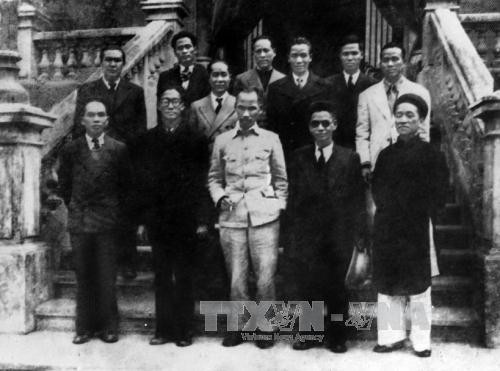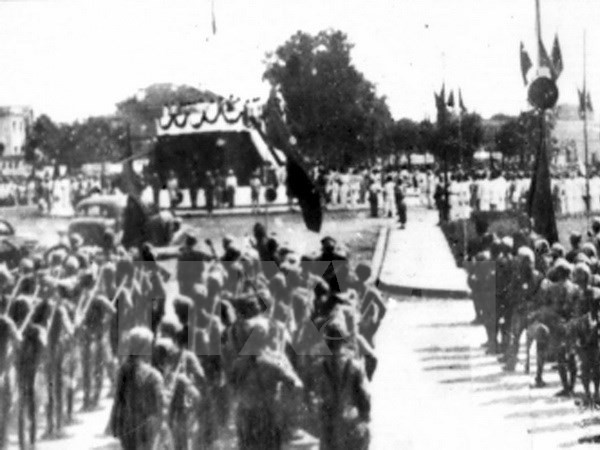(VOVWORLD) - Ho Chi Minh's Thought on a law-governed state of the people, by the people, and for the people when building the first worker-peasant state in Southeast Asia after the August 19, 1945 Revolution has maintained its importance in the organization and operation of a state serving the people and society and building a Vietnamese socialist state governed by law.
 The interim government of the Democratic Republic of Vietnam was established in August 1945. (File photo: VNA) The interim government of the Democratic Republic of Vietnam was established in August 1945. (File photo: VNA) |
Ho Chi Minh's Thought on a state governed by law of the people, by the people, and for the people skillfully combines Marxism-Leninism with selective inheritance and absorption of human knowledge and creatively applies it to Vietnam’s specific conditions.
It is a state of the people, by the people, and for the people. As President Ho Chi Minh said at a Government meeting on September 3, 1945: "The general election was held for all people to elect the National Assembly. The National Assembly will designate a Government. The Government is truly of the people. State power is the power of the people, entrusted by the people to state agencies.”
A special feature of Ho Chi Minh's Thought on a state-governed by law is the combination of law and morality in state and social management. He said morality is the root of the law, and law is the standard morality of society. The state governed by law respects and protects human and civil rights.
In the Declaration of Independence that gave birth to the Democratic Republic of Vietnam on September 2, 1945, President Ho Chi Minh said: "People are born free and have equal rights and must always have freedom and equal rights”.
 President Ho Chi Minh read the Declaration of Independence at Ba Dinh square on September 2, 1945. (File photo) President Ho Chi Minh read the Declaration of Independence at Ba Dinh square on September 2, 1945. (File photo) |
Ho Chi Minh's Thought on human rights covers the right to equality, the right to life, the right to freedom, and the right to pursue happiness, as well as the right to mastery, the right to be protected by law, the rights of travel, residence, citizenship, marriage, family, and property ownership, and the freedom of thought, belief, and religion. Human rights in Ho Chi Minh's Thought cover all civil, political, economic, cultural and social rights.
Ho Chi Minh’s Thought says a state governed by law is a state with a democratic legal system that expresses the will and interests of the people. The democracy of the law is not only demonstrated in the content of laws recognizing the rights and interests of the people, but also in the people’s involvement in law-making. The law-making process takes into consideration initiatives and opinions of all people and mass organizations. Vietnam has always encouraged the participation and opinions of people from all walks of life in writing laws and the Constitution.
President Ho Chi Minh emphasized the legal responsibility of the Party, the State and Party members for not carrying out their functions, tasks, and powers in a law-governed state. He called for measures to control state power, fight bureaucracy, corruption, and waste in the state apparatus, and build a system of professional, pure state employees to serve the people.
Since the August Revolution that began on August 19, 1945, and the establishment of the Democratic Republic of Vietnam on September 2, 1945, Vietnam has creatively applied Ho Chi Minh’s Thought on building a socialist state governed by law by regularly reforming the legal procedures, improving the capacity of law-making, and ensuring a comprehensive, unified, transparent, and feasible legal system suitable to national socio-economic conditions and reflecting the will of the people.
Building and perfecting the legal system and law enforcement come from the requirement of respecting the Constitution and laws in a socialist state governed by law, ensuring people's right to mastery, building a socialist-oriented market economy, and fixing the limitations and shortcomings of the legal system.
Vietnam has institutionalized regulations on human rights, constitutional rights, and freedom of citizens and ensured two-way responsibilities between the State and citizens in promoting and implementing human and civil rights.
Vietnam also strengthens mechanisms for controlling state power, fighting bureaucracy, corruption, and wastefulness in the state apparatus, and building a contingent of qualified cadres and civil servants.